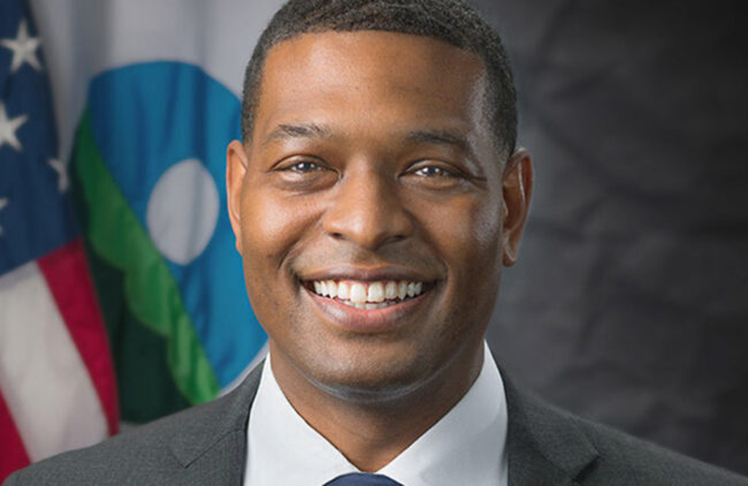
By Stacy M. Brown, NNPA Newswire Senior National Correspondent
U.S. Environmental Protection Agency Administrator Michael S. Regan remains on a journey to justice.
He said President Joe Biden’s historic bipartisan infrastructure bill provides an opportunity to finally rid America of poisonous lead pipes and free communities of color of the toxins that have polluted their neighborhoods for centuries.
“I’m the first Black man ever to lead this agency, the first to graduate from a historically Black college (North Carolina A&T) leading this agency,” said Regan, who made a special appearance on the National Newspaper Publishers Association’s live daily morning news program, “Let It Be Known.”
The program can be viewed on youtube.com/blackpressusatv, facebook.com/BlackPressUSA, and on Twitter @BlackPressUSA.
During a recent discussion with NNPA President and CEO Dr. Benjamin F. Chavis Jr., Regan declared that the Biden-Harris administration is “passionate about the environment and public health.”
The bipartisan infrastructure law invests $3.5 billion in cleaning up superfund sites and addressing the nation’s legacy of pollution, he stated.
Regan said the law delivers more than $50 billion to EPA to improve America’s drinking water, wastewater, and stormwater infrastructure.
Further, it provides $15 billion to the Drinking Water State Revolving Fund (SRF) for Lead Service Line Replacement, $4 billion to the Drinking Water SRF for Emerging Contaminants, and $5 billion to Water Infrastructure Improvements for the Nation Grants to address emerging contaminants.
“There are still 6 to 10 million lead services lines in cities and towns across the country, many in communities of color and low-income neighborhoods,” stated Regan, who also will appear later this year on PBS-TV’s “The Chavis Chronicles,” hosted by Dr. Chavis.
Because of the investments in the infrastructure law, millions of American families will no longer have to fear the harmful health effects caused by lead and other pollutants in their water, Regan asserted.
He recounted a visit to Lowndes County, Alabama, where he found disturbing facts about water in communities of color.
Regan said he witnessed homes with malfunctioning septic systems that discharged untreated sewage into backyards.
“Where little children play,” he added.
“There also was straight piping into lagoons and to have to see children walk around delicately so that they don’t sink or get bogged down into their own front yards. This is not the America that we all know it should be.”
He continued:
“This is unacceptable. Safe drinking water, safe sewer systems, you know, this is a basic right. These individuals deserve what every American deserves: clean water and a safe environment.”
On a visit to Wilkins Elementary School in Jackson, Mississippi, Regan recounted another difficult-to-stomach experience for young children of color.
City officials declared a citywide mandate to boil water as Regan arrived because of the discovery of toxic chemicals.
Regan said he had scheduled time to speak with second and third graders and found port-a-potties stationed outside the school.
“It looked like a worksite, and many of the kids had already been sent home because they couldn’t prepare food because of the water,” Regan remarked.
“This is on the heels of a pandemic. But the kids who remained behind were so excited because they got to see someone who looked like them in my position and someone who cared.”
Regan said in each location he visits, he’s sure to invite the national media to accurately report what’s going on in communities across the nation.
“The bipartisan infrastructure provides resources for our communities. There are matching grants and forgivable loans, which means more of our communities have an opportunity to compete for these grants,” he stated.
“We are also making $50 million available for technical assistance to help our communities to become more competitive. I’ve written a letter to every governor in the country outlining the criteria by which we believe those resources should be spent.”
Regan continued:
“I’ve traveled and met with mayors because a lot of this action starts at the ground level.”
Regan said he developed a passion for public service as a young person.
His father graduated from North Carolina A&T and served in Vietnam, working as an agricultural extension agent and with the national guard.
For 40 years, Regan’s mother worked as a nurse.
“I grew up with the desire to contribute to society because of what I saw in my home,” he exclaimed.
Regan studied environmental science and earth science.
Notably, he said Biden’s proposed 2023 budget request for EPA provides $11.9 billion to advance key priorities, including tackling the climate crisis, delivering environmental justice, protecting air quality, upgrading the nation’s aging water infrastructure, and rebuilding core functions at the Agency.
Regan said EPA continues to prioritize addressing climate change with the focus and resources the crisis demands.
“At EPA, we know both climate mitigation and adaptation are essential components of the strategy to reduce the threats and impact of climate change,” Regan said.
“We will invest in programs to reduce greenhouse gas emissions, including an additional $100 million for air quality grants to states and tribes to reduce greenhouse gas emissions on a local and regional scale.”
Regan further acknowledged that the communities hardest hit by pollution and climate change are most often communities of color, indigenous communities, rural communities, and poor communities.
“For generations, many of these vulnerable communities have been overburdened with higher instances of polluted air, water, and land,” Regan said.
“This inequity of environmental protection is not just an environmental justice issue but also a civil rights concern. Neither an individual’s skin color nor the wealth of their zip code should determine whether they have clean air to breathe, safe water to drink, or healthy environments in which their children can play.
“I am not afraid to enforce the laws on the books to make sure our children are breathing clean air.”















